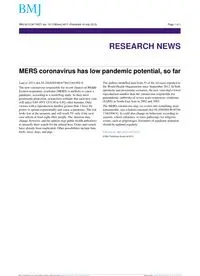
2013 MERS coronavirus has low pandemic potential, so far PDF
Preview 2013 MERS coronavirus has low pandemic potential, so far
MERS coronavirus has low pandemic potential, so far Lancet 2013; doi:10.1016/S0140-6736(13)61492-0 The new coronavirus responsible for recent clusters of Middle Eastern respiratory syndrome (MERS) is unlikely to cause a pandemic, according to a modelling study. In their most pessimistic projection, researchers estimate that each new case will infect 0.69 (95% CI 0.50 to 0.92) other humans. Only viruses with a reproduction number greater than 1 have the power to spread exponentially and cause a pandemic. The risk looks low at the moment, and will reach 5% only if the next case infects at least eight other people. The situation may change, however, and the authors urge public health authorities to intensify their search for the animal host. Goats and camels have already been implicated. Other possibilities include bats, birds, mice, dogs, and pigs. The authors modelled data from 55 of the 64 cases reported to the World Health Organization since September 2012. In both optimistic and pessimistic scenarios, the new virus had a lower reproduction number than the coronavirus responsible for prepandemic outbreaks of severe acute respiratory syndrome (SARS) in South East Asia in 2002 and 2003. The MERS coronavirus may yet evolve into something more transmissible, says a linked comment (doi:10.1016/S0140-6736( 13)61504-4). It could also change its behaviour according to seasons, school calendars, or mass gatherings for religious events, such as pilgrimages. Estimates of pandemic potential should be updated regularly. Cite this as: BMJ 2013;347:f4371 © BMJ Publishing Group Ltd 2013 For personal use only: See rights and reprints http://www.bmj.com/permissions Subscribe: http://www.bmj.com/subscribe BMJ 2013;347:f4371 doi: 10.1136/bmj.f4371 (Published 10 July 2013) Page 1 of 1 Research News RESEARCH NEWS
